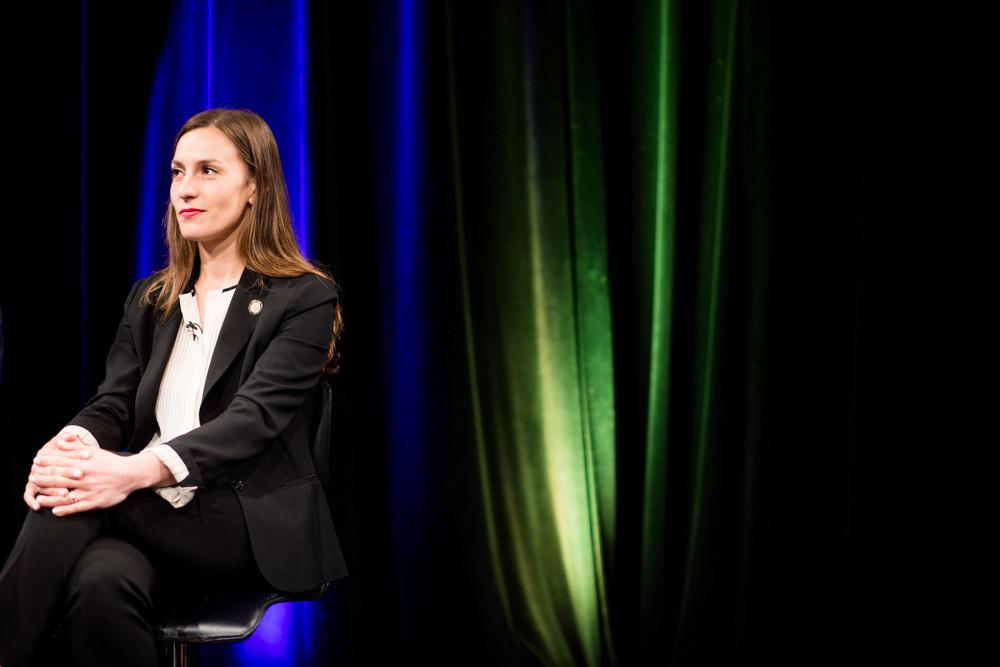Klein, Biaggi come out swinging in lone TV debate
Ghosts of IDC past continue to haunt senator in final weeks leading to the Sept. 13 primary
Alessandra Biaggi couldn’t help but laugh.
It was early in what will likely be her only televised debate with the man she wants to replace, state Sen. Jeffrey Klein, and she just couldn’t keep a straight face.
“I think my accomplishments speak for themselves locally, because I have a real connection to the Bronx,” Klein had said. “Born and raised, educated in Bronx public schools. My opponent has absolutely no connection to the Bronx, other than she used to visit her grandfather and swim in his indoor pool in Riverdale.”
Talking about the indoor pool at The Whitehall where Biaggi’s grandparents once lived, the attorney and former Andrew Cuomo staffer wanted to make it clear: “So, I actually never swam in that pool.”
But that wasn’t Biaggi’s main point during the televised debate at Lehman College on Monday afternoon. She wanted to make sure Klein remembered the Bronx isn’t the only home for District 34.
“My grandparents did live in Riverdale, I came of age in the Bronx,” she said. “I was born in Mount Vernon, and just for a little bit of a lesson on what the district comprises, so the district also includes Mount Vernon and Pelham. It’s not just the Bronx. It’s actually the entirety of these neighborhoods.”
Yet, it won’t be a battle of who has the more impressive street cred when voters decide who will represent them on the Democratic ballot on Sept. 13. Instead, it’s going to come down to who will best deliver to a state that has had split partisan representation in the legislature’s two chambers, with the hopes of bringing a Democratic majority in November.
Some people, including Biaggi, have blamed Klein for that split. For the last seven years, his small group of breakaway Democrats was part of something he called the Independent Democratic Conference, which ultimately caucused and solidified control with the Republicans. Biaggi has bashed Klein on the campaign trail, saying the partnership has blocked a number of progressive issues, including single-payer health care and women’s reproductive rights.
The IDC may be a group of the past, but Klein told moderator Gary Axelbank that he doesn’t accept that version of those events.
“Since my opponent started her campaign in January, she’s been peddling this false narrative that somehow I empowered or made the Republican majority, which isn’t true, and I blocked progressive legislation,” Klein said.
“First and foremost, over the last four years, as you can see now, the 32nd vote that gave the Republicans the majority is Simcha Felder of Brooklyn. That’s why we’re 31 Democrats right now in the Democratic conference, unable to get all these things done. I think we really need a civics lesson.”
Felder, who represents Borough Park and Midwood, was elected a Democrat in 2012, but immediately caucused with Republicans. He has hinted to reporters in the past that he would shift back over to the Democrats if they could win the majority, but didn’t make that trip across the aisle when the IDC dissolved earlier this year.
Felder didn’t rule out rejoining the Democrats after the November elections, however, saying he didn’t do it this past spring because the current term was coming to an end anyway, and changing the leadership at this point would make little sense.
Biaggi wasn’t buying it.
“In 2012, when the Democrats had 33 seats, my opponent decided instead of voting for Sen. (Andrea) Stewart-Cousins to be the majority leader — who would’ve been the first woman, the first black woman, to lead a majority conference — he voted to put as a leader Dean Skelos, who is a Republican anti-choice person who is now on his way to prison,” she said. “So that is not of the likings of somebody who cares about a Democratic majority, who cares to ensure that it sustains as a Democratic majority.”
Klein, however, couldn’t escape talk of the IDC. In fact, Axelbank kicked off the 30-minute debate questioning why Klein and other former IDC members won’t return hundreds of thousands of dollars after a judge declared the campaign funds, raised through the state’s Independence Party, were not legal.
“We actually had a decision that was rendered by a judge that said in no way that we had to return the money,” Klein said.
“It was very clear that the decision said, ‘Reconstitute your committee.’ Anyone who is involved in the senate’s Independence campaign committee has to be a duly registered member of the Independence Party.”
But illegal is illegal, Biaggi said.
“I know it’s been a very long time since my opponent has been in law school, but the word ‘illegal’ means ‘against the law,’” Biaggi said.
“So anything that is deemed to be raised illegally, which is what the independent money has been deemed, needs to be returned. It is part and parcel of being an elected that you abide by the laws.”
If Klein wins the Sept. 13 primary, he is in-line to keep his seat as deputy leader under Stewart-Cousins. Still, Klein is facing real concern that after the election is over, he’ll put the IDC back together again.
“Absolutely not,” he said. “I’m the deputy minority leader, and I’m going to fight for a Democratic majority, and hopefully become deputy majority leader.”

















